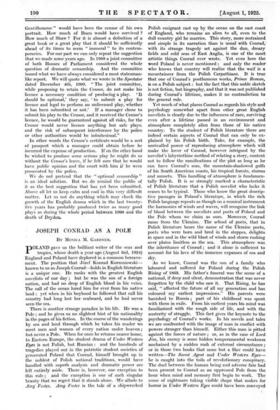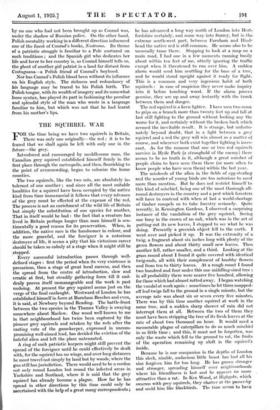JOSEPH CONRAD-. AS. A POLE
BY MONICA M. GARDNER.
POLAND gave us the brilliant writer of the seas and tropics, whose death a year ago (August 3rd, 1924) England and Poland have deplored in a common bereave- ment. The position that 46zef Konrad Korzeniowski- known to us as Joseph Conrad—holds in English literature is a unique one. He ranks with the greatest English novelists of our day ; but he was the son of a foreign nation, and had no drop of English blood in his veins. The call of the ocean lured him for ever from his native land : yet when in his boyhood he followed that call his country had long lost her seaboard, and he had never seen the sea.
" There is another strange paradox in his life. He was a Pole; and he gives us no slightest hint of his nationality in the pages of his fiction. In the course of the wanderings by sea and land through which he takes his reader we meet men and women of every nation under heaven ; but never a Pole. When for once he returns nearer home, to Eastern Europe, the student drama of Under Western Eyes is not Polish, but Russian : and the hundreds of tragedies played out in the patriotic student societies of persecuted Poland that Conrad, himself brought up in the noblest of Polish national traditions, would have handled with superb analysis and dramatic power are left entirely aside. There is, however, one exception to this rule ; and the exception is one of such singular beauty that we regret that it stands alone. -We aJlude to Amy' Poster. 'Amy 'Foster is the tale cif a shipwrecked Polish emigrant cast up by the ocean on the east coast of England, who remains an alien to all, even to the dull country girl he marries. This story, more restrained and simple in its narration than is usual with Conrad; with its strange tragedy set against the dun, dreary fields and cold seas of East Anglia, is one of the most artistic things Conrad ever wrote. Yet even here the word Poland is never mentioned ; and only the reader who knows that country will realize that the waif is a mountaineer from the Polish Carpathians. It is true that one of Conrad's posthumous works, Prince Roman, is on a -Polish subject : but the fact that this noble sketch is not fiction, but biography, and that it was not published during Conrad's lifetime, makes it no contradiction to the general rule.
Yet much of what places Conrad as regards his style and psychology somewhat apart from other great English novelists is clearly due to the influences of race, surviving even after a lifetime passed in an environment and atmosphere completely alien from those of his native country. To the student of Polish literature there are indeed certain aspects of Conrad that can only be ex- plained by his Polish birth. Take, for example, the unrivalled power of reproducing atmosphere which will make the lover of Conrad, however intrigued by the novelist's labyrinthine method of relating a story, content not to follow the ramifications of the plot as long as he can have Conrad's seas, the mountain-shadowed gulfs of his South American coasts, his tropical forests, storms and sunsets. This handling of atmosphere is fundamen- tally Polish. It is so strongly marked a characteristic of Polish literature that a Polish novelist who lacks it ceases to be typical. Those who know the great descrip- tive passages in Poland's literature, in which the rich Polish language repeats as though on a musical instrument the harmonies of winds and waves, will recognize the link of blood between the novelists and poets of Poland and the Pole whom We claim as ours. Moreover, Conrad came from the Ukraine. The school of poets, that in Polish literature bears the name- of the Ukraine poets, poets who were born and bred in the steppes, delights in space and in the wild blast of winds and storm rushing over plains limitless as the sea. This atmosphere was the inheritance of Conrad ; and' it alone is sufficient to account for his love of the immense expanses of sea and sky.
As we know, Conrad was the son of a family who laboured and suffered for Poland during the Polish Rising of 1863. His father's funeral was the scene of a national, if deep and silent, demonstration that was never forgotten by the child who saw it. That Rising, he has said, "affected the future of all my generation and has coloured my earliest impressions." His parents were banished to Russia ; part of his childhood was spent with them in exile. From his earliest years his mind was familiarized with the rough side of life, and with the austerity of struggle. This fact gives the keynote to the psychology of Conrad's works. In his novels and tales we are confronted with the image of man in conflict with powers stronger than himself. Either this man is pitted against the forces of nature ; or, as in the case of Lord Jim, his enemy is some hidden temperamental weakness unchained by a sudden rush of external circumstance ; or in those two books that none but a Slav could have written—The Secret Agent and Under Western Eyes— he is caught into the toils of revolutionary conspiracy. The duel between the human being and adverse fate had been present to Conrad as an oppressed Pole from the hour when mind and memory first begin to work. The sense of nightmare taking visible shape that makes for horror in Under Western Eyes could have been conveyed by no one who had not been brought up as Conrad was, under the shadow of Russian police. On the other hand, Polish mentality working in a different direction influenced one of the finest of Conrad's books, Nostromo. Its theme of a patriotic struggle is familiar to a Pole nurtured on such traditions ; and the Spanish girl who dedicates her life and lover to her country is, so Conrad himself tells us, the ghost of another girl patriot in a land far distant from Costaguana--a Polish friend of Conrad's boyhood. Nor has Conrad's Polish blood been without its influence on his English style. The richness and redundancy of his language may be traced to his Polish birth. The Polish tongue, with its wealth of imagery and its somewhat loose syntax, has played its part in fashioning the peculiar and splendid style of the man who wrote in a language familiar to him, but which was not that he had learnt from his mother's lips.







































 Previous page
Previous page